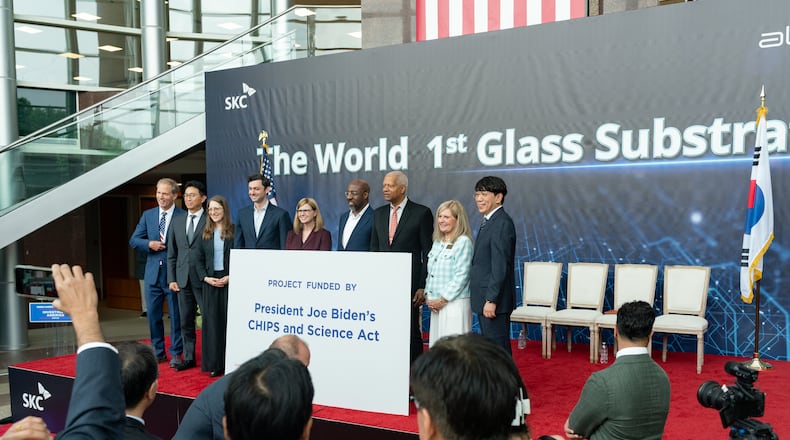A newly built Georgia factory will do more than just help stitch together tiny computer chips — it’ll become a large piece of an American effort to pry away China’s control over a critical technology.
Absolics, a subsidiary of South Korean conglomerate SK Group, has finished building its Covington factory where it will pump out thousands of glass substrates used to produce semiconductors. The facility is the first of its kind in the U.S. and represents one of the inaugural pieces in a domestic supply chain for computer chips that power everything from smartphones to supercomputers.
Credit: Ben Hendren
Credit: Ben Hendren
The U.S. produces only about 10% of the world’s computer chips, but China and other Asian counties control the vast majority of production — and hold a near monopoly on manufacturing the most advanced chip technologies. That roiled the U.S. in the wake of the COVID-19 pandemic, when a worldwide chip shortage brought many industries to a stand-still until Asian chipmakers restarted their assembly lines.
Further geopolitical tensions between the U.S. and China have pushed President Joe Biden’s administration to incentivize domestic semiconductor production.
Minjai Cho, Absolics board member and vice president of business innovation, said American companies’ growing reliance on these chips, especially with the rise of artificial intelligence, is further incentivizing companies to bring those manufacturing capabilities stateside.
“Because most of the end customers are located in the U.S., it’s pretty obvious (the industry) wants to be in the U.S,” Cho said.
Credit: Ben Hendren
Credit: Ben Hendren
Federal and state leaders also want semiconductor-related companies to set up shop here.
In late May, the Biden-Harris administration announced it had committed up to $75 million to help procure and install equipment inside Absolics’ factory in Covington. The grant is provided under the CHIPS and Science Act, a $280 billion package President Joe Biden signed into law in 2022 to help bolster domestic technology manufacturing.
Absolics is the first semiconductor-related company to obtain CHIPS funding, an announcement that was praised by the Semiconductor Industry Association.
“CHIPS is on track to deliver a huge return on investment and significant benefits to America’s economy, national security and supply chain resilience,” John Neuffer, the trade association’s president and CEO, said.
Credit: Courtesy Absolics
Credit: Courtesy Absolics
The plant, which was announced in 2021, was also the first economic development project heralded by Gov. Brian Kemp when he took office. His spokesperson credited state and local policies for Absolics’ Georgia investment.
Located about 45 minutes east of Atlanta along I-20, the factory is expected to open “no later than September,” according to Cho. He said the 120,000 square foot facility is a $300 million investment by SK Group and will employ about 200 local workers by the end of the year. The project is primed for expansion, which Cho said could double its facility size and employee base.
The company’s technology was developed in partnership with former Georgia Tech electrical engineering professor Sung Jin Kim, who now works for SK Group. Its proprietary glass substrates will allow for more chips to be packaged onto a single device while using less energy than the current industry standard of plastic substrates. The factory’s first phase can produce up to 48,000 glass substrates each year.
While manufactured in Georgia, the substrates will be shipped to Asia for final assembly into semiconductors. Cho said he expects other pieces of the computer chip supply chain to set up domestic operations in the coming years, especially given the growing presence of data center projects and other chipmakers like Nvidia.
Technology giants and data center developers have feverishly built gigantic warehouses filled with computer servers across the country, with metro Atlanta ranking as the fastest growing data center market in the nation. The fervor has stirred concerns over the vast amount of power needed by data centers and their financial return on government incentives, but they are large users of semiconductors that could help further domestic chip manufacturing.
“As these large players come in, we expect there’s going to be more suppliers,” he said. “The ecosystem will be built up around us.”
About the Author
Keep Reading
The Latest
Featured






